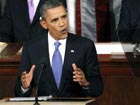| Videos | • Latest |
|
• Feature | • Sports | • Your Videos |
US Senate defeats Obama's jobs plan

 0 Comment(s)
0 Comment(s) Print
Print E-mail
CNTV, October 12, 2011
E-mail
CNTV, October 12, 2011
The U.S. Senate on Tuesday defeated President Barack Obama's jobs plan in a procedural vote as Republicans and some Democrats objected stimulus spending and a tax surcharge on the rich.
The 447-billion-dollars bill was stopped from advancing as the votes did not reach the needed number of 60. Forty-six Republicans joined with two Democrats to block the plan. That vote was not final. The roll call was kept open Tuesday night to allow Sen. Jeanne Shaheen, D-N.H. to vote. But it will not change the result.
The jobs plan, launched by Obama on Sept. 8 to tackle near double digit unemployment and to spur the sluggish economy, includes measures like payroll tax cuts for employers and employees, new investment in infrastructure projects as well as tax increase on million-dollar earners.
However, Republicans strongly opposed some parts of the president's jobs plan such as the tax increase on the rich, which finally led to the failure of the bill.
The Republicans held that the 2009 stimulus measure was an " expensive failure" and that the current jobs plan is just the same like that.
"Democrats' sole proposal is to keep doing what hasn't worked along with a massive tax hike that we know won't create jobs," said Senate Minority Leader Mitch McConnell, R-Ky., on Tuesday.
Obama said hours before the vote that he is prepared to break his jobs bill into pieces and try to move it that way if the whole plan is refused by the Congress.
"If they don't pass the whole package, we are going to break it up into constituent parts," the president said to his job council in Pittsburgh.
Meanwhile, the white house outlined parts of the plan that might be pursued separately, including cuts in payroll taxes for workers and employers, renewed unemployment benefits for the jobless, small business tax cuts, and spending on infrastructure.
Obama is trying to fix unemployment problem as he seeks succession, but the efforts are challenged greatly by Republicans.
U.S. unemployment, currently at 9.1 percent, is expected to keep as high as 9 percent into the 2012 presidential electoral year. Recent U.S. history shows that no president had succeeded reelection at such a high level of unemployment.






Go to Forum >>0 Comment(s)